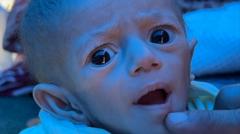The human toll of the ongoing crisis in Gaza is starkly illustrated through the eyes of a local cameraman capturing the struggles of families affected by the relentless conflict. In the shadow of destruction and deprivation, the plight of a five-month-old baby, Siwar Ashour, has become emblematic of the dire reality. She weighs just over 2kg, far less than the healthy weight for her age, and is unable to consume regular milk due to a severe allergic reaction.
Under the continuous Israeli offensive, each day presents new challenges for Siwar and her family. The cameraman’s poignant experience of documenting her suffering at Nasser hospital in Khan Younis prompted him to seek her out, moved by the innocence of a child caught in an unyielding warzone. However, his efforts to locate Siwar reveal the heartbreaking conditions in which she and her family now live—crammed into a single-room shack with little more than a handful of belongings.
Her mother, Najwa, acknowledges the gravity of their situation. “The situation is very dire,” she states, grappling with the remnants of her own malnutrition, which hindered her ability to breastfeed. The crisis not only deprives Siwar of essential nutrients but also its echo resounds through every aspect of their daily life—access to food and clean water is perilously scarce. According to reports, many mothers in Gaza confront a similar plight as lack of proper nutrition hampers breastfeeding attempts.
As the wider context of the Israeli blockade continues to unfold, claims from Israeli officials regarding sufficient food supplies in Gaza contradict testimonies from those on the ground. Humanitarian organizations assert that the provision of aid remains critically insufficient, leading to escalating malnutrition and suffering among the population. The UN has further voiced concerns, characterizing the aid delivered as negligible in the face of overwhelming need.
Against this backdrop, Najwa and Siwar remain trapped in a heartbreaking cycle of survival. The burdens of a war-torn existence manifest in their every interaction. Siwar is startled awake by the sounds of gunfire and explosions that punctuate her early life. Najwa's painful admission reflects the uncertainty that hovers over their future as she expresses little hope beyond the immediate struggle to survive.
Najwa's profound loss—the absence of a secure home, proper nutrition, and the continuous threat of violence—reminds us that for those in Gaza, each moment is a fight for existence. Her poignant testimony represents just a fragment of the suffering experienced by millions, seeking to endure in the dire aftermath of ongoing conflict.





















